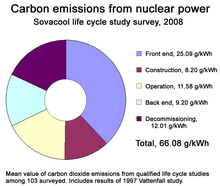Benjamin K. Sovacool
Benjamin K. Sovacool is a Visiting Associate Professor at Vermont Law School and founding Director of the Energy Justice Program at their Institute for Energy and Environment. He was formerly an Assistant Professor and Research Fellow at the National University of Singapore.
Sovacool's research interests include energy policy, environmental issues, and science and technology policy.[1] He is the author or editor of eight books and more than 130 peer reviewed academic articles on various aspects of energy policy and climate change, and has presented research at more than 60 international conferences and symposia. He is a frequent contributor to Energy Policy, Energy & Environment, Electricity Journal, and Energy, and Energy for Sustainable Development.
In 2007 Sovacool co-edited Energy and American Society: Thirteen Myths and in 2008 he wrote The Dirty Energy Dilemma which won a 2009 Nautilus Award. His other books include Powering the Green Economy, The Routledge Handbook of Energy Security, Contesting the Future of Nuclear Power, and Climate Change and Global Energy Security.
Academic experience
Sovacool is a Visiting Associate Professor at Vermont Law School and founding Director of the Energy Justice Program at their Institute for Energy and Environment. He was previously assistant professor at the Lee Kuan Yew School of Public Policy at the National University of Singapore, and Research Fellow in the Energy Governance Program at the Centre on Asia and Globalization. Sovacool has a PhD in Science and Technology Studies from Virginia Tech.[2]
Sovacool has served in advisory and research capacities at the National University of Singapore, U.S. National Science Foundation's Electric Power Networks Efficiency and Security Program, Virginia Tech Consortium on Energy Restructuring, Virginia Center for Coal and Energy Research, New York State Energy Research and Development Authority, Oak Ridge National Laboratory, Semiconductor Materials and Equipment International, U.S. Department of Energy's Climate Change Technology Program, Union of Concerned Scientists, the International Institute for Applied Systems and Analysis near Vienna, Austria, and the International Energy Agency in Paris, France.[3][1][4]
Sovacool has consulted for the Asian Development Bank, United Nations Development Program, and United Nations Economic and Social Commission for Asia and the Pacific.[3]
Research work

Sovacool's research interests include energy policy, environmental issues, and science and technology policy.[1] He is the author or editor of eight books and more than 130 peer reviewed academic articles on various aspects of energy policy and climate change, and has presented research at more than 60 international conferences and symposia. He is a frequent contributor to Energy Policy, Energy & Environment, Electricity Journal, and Energy, and Energy for Sustainable Development. Sovacool has also appeared on the BBC World News, Bloomberg Live!, and Channel News Asia and been interviewed by Newsweek International, Associated Press, United Press International.[1][6]
His work on carbon emissions from nuclear power stations has also been reviewed in Nature.[7]
Books
In 2007, Sovacool co-edited Energy and American Society: Thirteen Myths which has been reviewed in Energy Policy[8] and the Annals of the Association of American Geographers.[9] In 2008, he wrote The Dirty Energy Dilemma: What’s Blocking Clean Power in the United States which was published by Praeger and won a 2009 Nautilus Award.[6]
In Contesting the Future of Nuclear Power (2011) Sovacool says that there is a "consensus among a broad base of independent, nonpartisan experts that nuclear power plants are a poor choice for producing electricity", and that "energy efficiency programs and renewable power technologies are better than nuclear power plants".[10]
His other books include:
- Miguel Mendonça, David Jacobs and Benjamin K. Sovacool (2009). Powering the Green Economy: The Feed-In Tariff Handbook, Earthscan.
- Benjamin K. Sovacool (Ed.) (2010). The Routledge Handbook of Energy Security, Routledge.
- Marilyn A. Brown and Benjamin K. Sovacool (2011). Climate Change and Global Energy Security: An Overview of Technology and Policy Options, MIT Press.
- Benjamin K. Sovacool and Scott Valentine (forthcoming). The International Politics of Nuclear Power: Economics, Security and Governance, Routledge.
- Benjamin K. Sovacool, and IM Drupady (forthcoming). The Governance of Small-Scale Renewable Energy in Developing Asia, (New York: Ashgate).
See also
- Peter A. Bradford
- Mark Cooper
- Amory Lovins
- Mycle Schneider
- M.V. Ramana
- David A. Schlissel
- Stephen Thomas (professor)
- Mark Diesendorf
- Renewable energy policy
- Comparisons of life-cycle greenhouse gas emissions
References
- ^ a b c d Profile: Benjamin K. Sovacool
- ^ Vermont Law School Faculty Directory
- ^ a b Institute for Energy and the Environment
- ^ Benjamin K. Sovacool, Marilyn A. Brown. The Dirty Energy Dilemma: What's Blocking Clean Power in the United States, ABC-CLIO, 2008, ISBN 9780313355400, ISBN 0313355401.
- ^ Benjamin K. Sovacool. A Critical Evaluation of Nuclear Power and Renewable Electricity in Asia, Journal of Contemporary Asia, Vol. 40, No. 3, August 2010, p. 386.
- ^ a b Curriculum Vitae: Dr. Benjamin K. Sovacool
- ^ Kurt Kleiner. Nuclear energy: assessing the emissions, Nature Reports Climate Change, 24 September 2008.
- ^ Fereidoon P. Sioshansi. Energy and American Society—Thirteen Myths (Book Review) Energy Policy, 35 (2007), pp. 6554–6555.
- ^ Pasqualetti, Martin J. (2008). "Review of Energy and American Society--Thirteen Myths, B. Sovacool, M. Brown (eds.)". Annals of the Association of American Geographers. Vol. 98, no. 2. Routledge. pp. 504–505. doi:10.1080/00045600801944210Template:Inconsistent citations
{{cite news}}: CS1 maint: postscript (link). - ^ Benjamin K. Sovacool (2011). "Contesting the Future of Nuclear Power" (PDF). World Scientific. p. 248–250.
